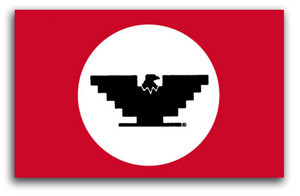
 |
Cesar Chavez Timeline |
| Time | Event |
|---|---|
| Cesar Estrada Chavez is born in San Luis, Arizona. | |
| 1937 | Chavez's parents lose their farm and begin to work as migrant laborers. |
| 1938 | Chavez's family moves to California, working as farm laborers. |
| 1942 | After graduating from 8th grade, Chavez becomes a full-time farm worker to help support his family (his father had recently been hurt in a car accident). |
| 1944 | Chavez challenges segregation (white vs. Mexican) and refuses to sit in the Mexican section of a theater; he is held in custody for an hour. |
| 1944-1946 | Chavez fought in World War 2, in the US Navy. |
| 1948 | Chavez and Helen Fabela are married. |
| 1952 | Chavez joins the Community Service Organization (CSO). |
| 1962 | Chavez forms the National Farm Workers Association (NFWA). |
| 1964 | Chavez starts El Malcriado: The Voice of the Farm Worker, the official newspaper of the NFWA. |
| 1965 | NFWA members go on strike against grape growers and start a local grape boycott. |
| 1966 | Senator Robert Kennedy supports the NFWA grape boycott. |
| 1966 | Chavez leads a 250-mile march from Delano to Sacramento, California, to let the public and law-makers know about the mistreatment of farm workers. |
| Chavez starts his first hunger strike; it lasts for 25 days in February and March (it was done to stop violence against strikers). | |
| 1968 | The nationwide boycott of California grapes begins. |
| 1969 | Pesticide use is regulated. |
| Dec. 14, 1970 | Chavez is jailed for defying a court order againt boycotting. |
| 1974 | The name of the NFWA changes to United Farm Workers (UFW). |
| 1975 | The California Labor Relations Act was passed; it was the first law that protected the rights of organizations of farm laborers . |
| 1975 | Chavez leads a 1,000 mile march through the Central Valley of California, in order to call attention to the union elections. |
| 1975 | The use of the short-handled hoe (el cortito) is banned by the Supreme Court. |
| 1978 | Chavez announces that all general lettuce and grape boycotts are ended. |
| 1984 | Chavez announces a new grape boycott, due the excessive use of pesticides. |
| 1987 | The UFW produces a film call The Wrath of Grapes, about the dangerous use of pesticides on food. |
| 1992 | Chavez leads a 1,000-person march calling for improved working conditions in farms. |
| April 23, 1993 | Cesar Estrada Chavez dies during a fast. |
| 1994 | Chavez is awarded the Presidential Medal of Freedom. |
| 2003 | The US Post Office issues a Cesar Chavez stamp (first class, 37¢). |